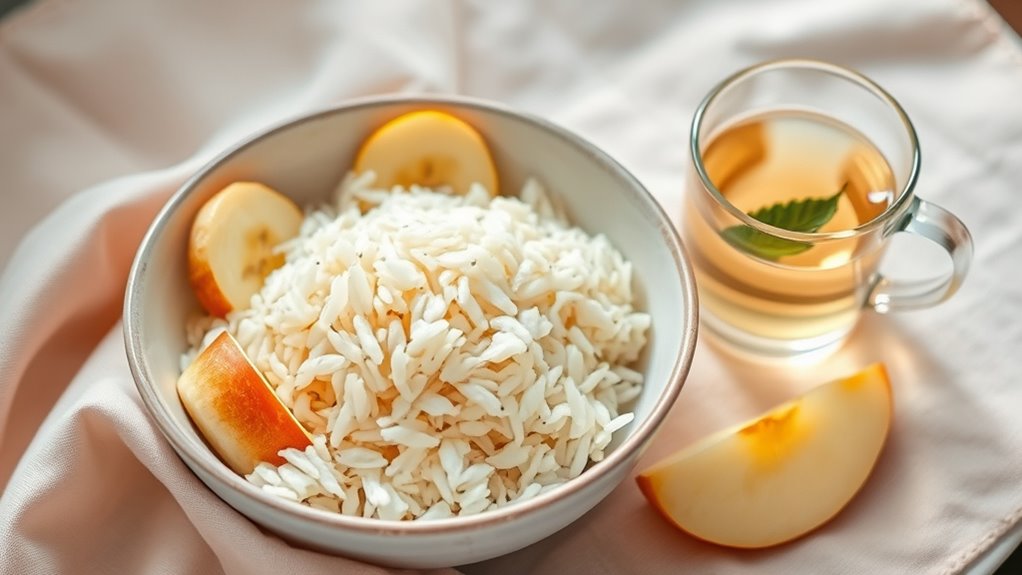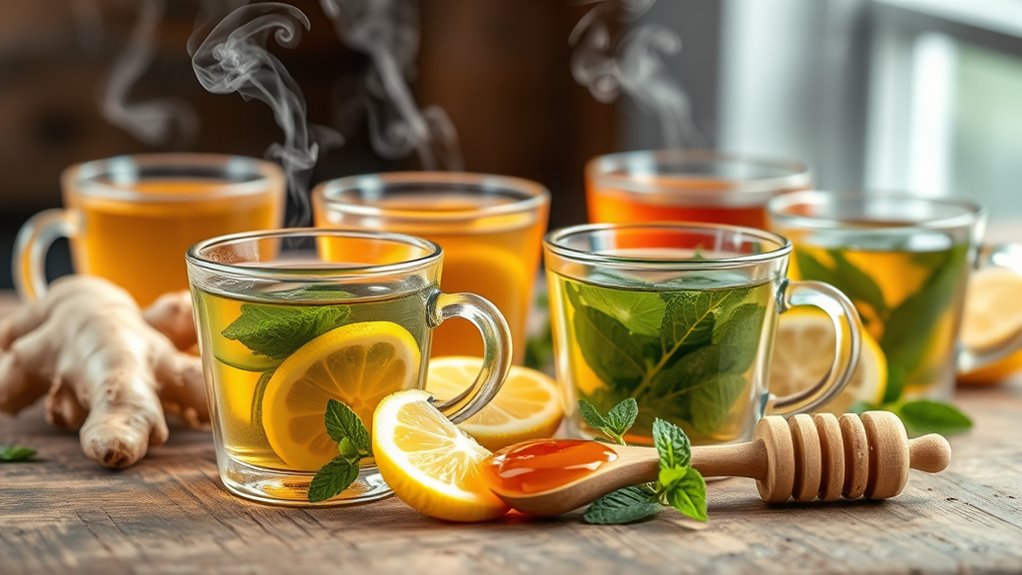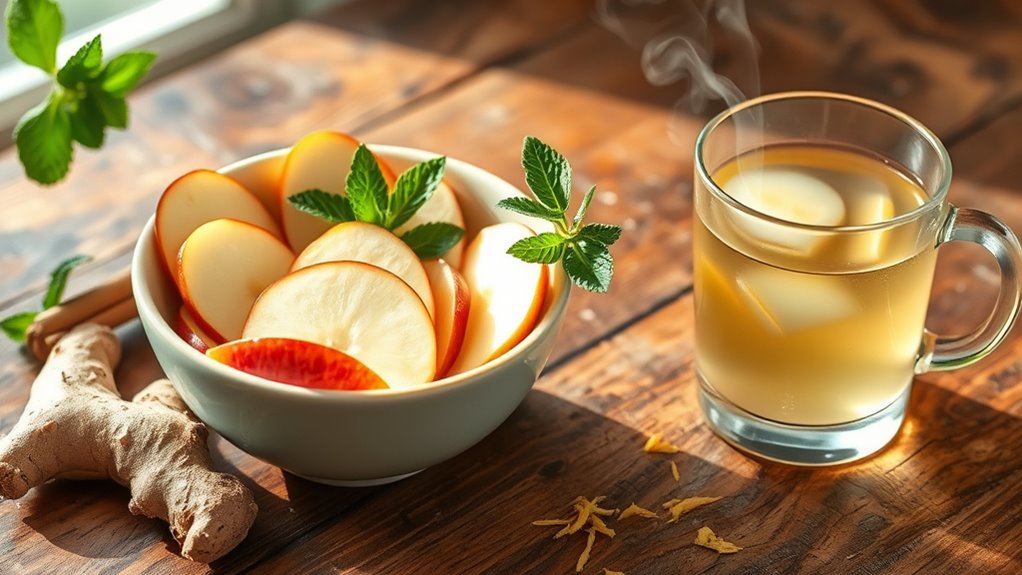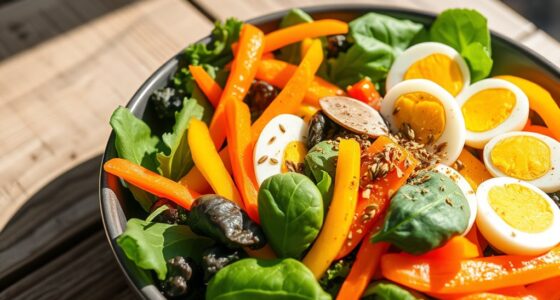To ease chemo-induced nausea, opt for bland, easy-on-the-stomach foods like plain crackers, bananas, and cooked vegetables. Drink small sips of electrolyte-rich beverages like coconut water or herbal teas such as ginger or peppermint to stay hydrated. Incorporate soft fruits and gentle carbs into your meals, and consider natural remedies to soothe your stomach. Keep in mind, choosing the right foods can make a big difference; you’ll find more helpful tips as you explore further.
Key Takeaways
- Consume bland, easy-on-the-stomach foods like plain crackers, rice cakes, bananas, and boiled potatoes to soothe nausea.
- Hydrate with electrolyte drinks, coconut water, or warm herbal teas such as ginger or peppermint to reduce dehydration and nausea.
- Include gentle fruits and vegetables like cooked carrots and peeled apples, avoiding greasy or spicy options.
- Use natural remedies like ginger and peppermint teas to calm stomach muscles and alleviate nausea sensations.
- Eat small, frequent meals with bland foods, and prepare meals in advance to minimize stress and maintain consistent intake.
Gentle Carbohydrates to Soothe Your Stomach

When your stomach feels upset, choosing gentle carbohydrates can help calm nausea. Opt for sugar-free options like plain crackers, rice cakes, or toast, which are easy on your stomach. Bland snack ideas such as bananas or plain boiled potatoes can also provide comfort without overwhelming your digestive system. These foods are low in fat and fiber, reducing the risk of irritation. Stick to small, frequent portions to avoid overloading your stomach. Avoid greasy, spicy, or heavily seasoned foods that can worsen nausea. Incorporating gentle carbs helps stabilize blood sugar levels and soothes your gastrointestinal tract. Remember, simple, bland options are your best bet during times of nausea, giving your stomach a chance to recover without added stress.
Hydrating Beverages to Combat Dehydration

Dehydration from nausea can worsen your discomfort, but staying hydrated with the right beverages can help you recover more quickly. Electrolyte drinks are excellent because they replenish lost minerals like sodium and potassium, helping maintain your fluid balance. Coconut water is another natural option; it’s gentle on your stomach, hydrating, and packed with electrolytes. Sip small amounts frequently to avoid feeling overwhelmed or triggering nausea. Avoid sugary or caffeinated drinks, which can dehydrate you further. If you find plain water unappealing, flavored electrolyte drinks or coconut water provide a more palatable way to stay hydrated. Keeping your fluid intake steady helps combat dehydration, alleviates some nausea, and supports your recovery during treatment.
Easy-to-Digest Fruits and Vegetables

Opting for easy-to-digest fruits and vegetables can make a significant difference when you’re feeling nauseous. These foods are gentle on your stomach and can help reduce nausea symptoms. Try incorporating bananas, cooked carrots, or peeled apples, which are less likely to upset your stomach. Ginger supplements can also soothe nausea without overwhelming your system. Peppermint candies are another simple option to calm your stomach and freshen your breath. Keep these on hand to help manage nausea throughout the day. Remember to eat small portions and chew slowly. Soft, bland options are best until your symptoms improve. Including these fruits and vegetables in your diet can make a noticeable difference in comfort and recovery during chemotherapy. Vetted options like flat iron bikes demonstrate the importance of choosing reliable, well-designed products to enhance your experience.
Herbal Teas and Natural Remedies for Nausea

Herbal teas and natural remedies can be effective for soothing nausea and calming your stomach. Ginger remedies are well-known for their anti-inflammatory properties and can help reduce nausea caused by chemotherapy. Sipping ginger tea or chewing fresh ginger can provide quick relief. Peppermint teas are another popular choice; they relax stomach muscles and help ease nausea sensations. You might find that a warm cup of peppermint tea helps settle your stomach during or after treatment. Both ginger remedies and peppermint teas are gentle, natural options that don’t interfere with medications. Keep a small supply handy so you can enjoy these soothing drinks when nausea strikes. Incorporating these herbal remedies into your routine can offer comfort and support your nausea management. Additionally, best anime movies can serve as a comforting distraction during recovery.
Tips for Incorporating Nausea-Relieving Foods Into Your Diet

Incorporating nausea-relieving foods into your diet can be simple and effective when you plan ahead. Focus on smart meal timing to prevent overeating or long gaps that worsen nausea. To avoid spice alternatives that might irritate your stomach, opt for bland, gentle options like ginger or plain crackers. Here are some tips to help you get started:
- Eat small, frequent meals instead of large ones
- Incorporate gentle spices like ginger or fennel for flavor
- Choose easily digestible foods, avoiding greasy or spicy dishes
- Prepare meals in advance to reduce stress and ensure consistency
- Pay attention to how different foods affect your nausea, adjusting spice alternatives accordingly
- Select low-carb and keto-friendly options like plain crackers or nuts to keep nutrition balanced and stomach-friendly
Frequently Asked Questions
Are There Specific Foods to Avoid During Chemotherapy?
During chemotherapy, you should avoid foods that trigger your food allergies or cause digestive issues. Steer clear of raw or unpasteurized items, spicy foods, and processed snacks that may irritate your stomach. Also, be cautious with dietary supplements, as they can interact with treatment. Always consult your doctor before making changes, and stick to gentle, easy-to-digest foods to help manage side effects and support your recovery.
How Can I Manage Taste Changes While Eating?
To manage taste changes while eating, try flavor enhancement by adding herbs, lemon, or spice to your meals to boost flavor. You can also experiment with texture modification, like choosing softer or crunchier foods based on your preferences. Eating small, frequent meals helps, and staying hydrated can improve taste perception. These strategies make eating more enjoyable and help you get the nutrients you need during this time.
Can Certain Foods Help Reduce Chemotherapy Fatigue?
While managing chemotherapy fatigue, you might find that certain foods help boost your energy levels. Nutritional supplements can fill in nutritional gaps, supporting your strength. Herbal teas like ginger or ginseng may also help reduce fatigue naturally. Incorporate these into your routine, and always consult your healthcare provider to confirm they’re suitable for your treatment plan. Staying well-nourished and rested can make a noticeable difference in how you feel.
What Are Quick, Easy Nausea-Relief Snacks?
When seeking quick, easy nausea-relief snacks, try incorporating ginger remedies like ginger chews or tea, as they’re known for calming your stomach. Bland snacks such as plain crackers, toast, or bananas can also soothe nausea without overwhelming your palate. Keep these options handy for rapid relief, and remember, small, frequent snacks often work best to keep nausea at bay and support your comfort.
How Do I Handle Food Aversions Caused by Treatment?
Imagine you’re steering a maze, and food aversions feel like dead ends. To handle this, try simple food pairing to make meals more appealing, and use flavor masking to hide tastes you dislike. Keep experimenting with textures and temperatures, and listen to your body’s signals. You might find that mild, familiar foods or cold dishes help you tolerate eating better, turning a frustrating maze into a manageable path.
Conclusion
Remember, just as the phoenix rises from ashes, you can find renewed strength through gentle foods and hydration. Each small step you take toward easing nausea brings you closer to brighter days ahead. Embrace these nourishing options as your allies in this journey, knowing that resilience blooms even in the toughest times. Stay compassionate with yourself, and trust that with patience and care, you’ll find moments of relief and hope along the way.









